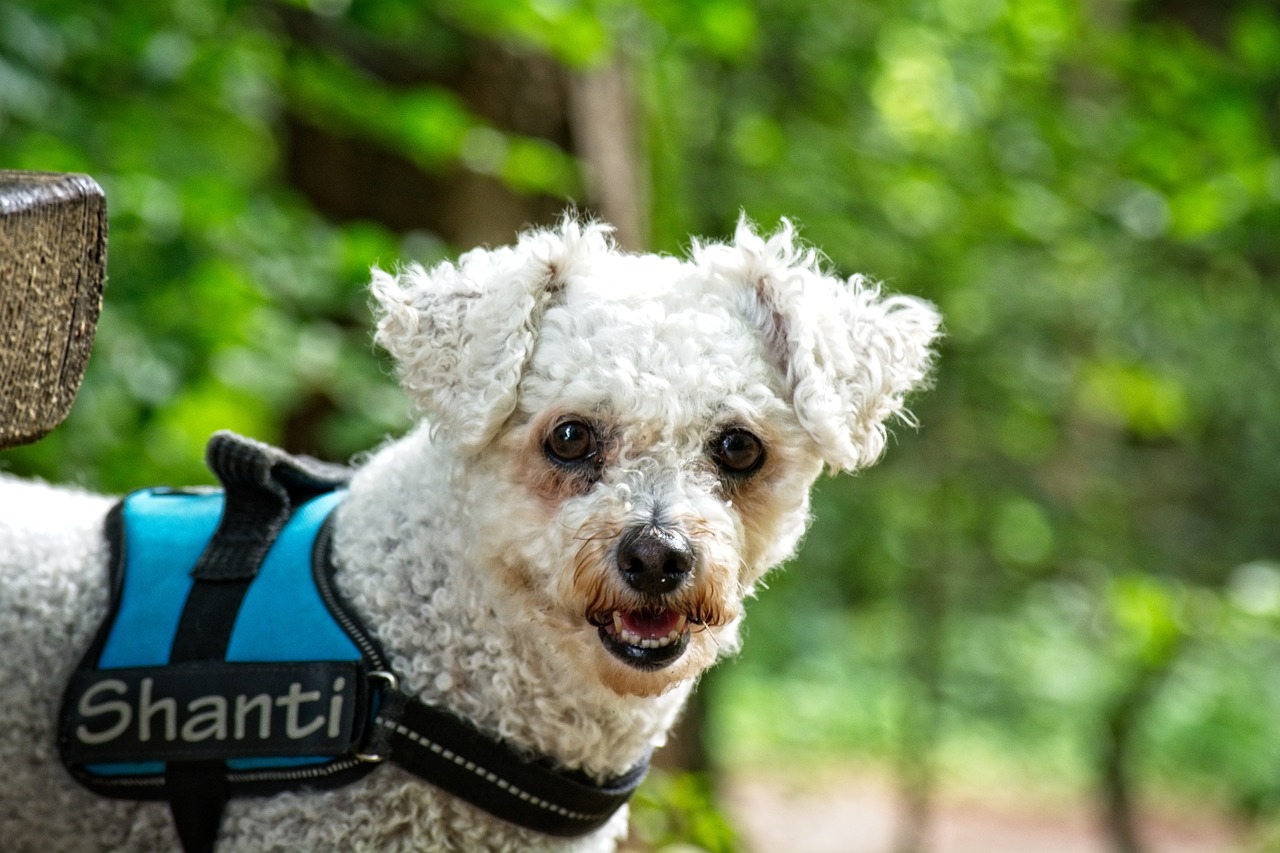The Bichon Frise, characterized by its fluffy white coat and jovial disposition, is a small dog breed brimming with enthusiasm. This article will explore nine crucial aspects of Bichon Frise’s temperament and personality.
1. Friendly and Affectionate
Bichon Frises are renowned for their friendly and affectionate nature. They are eager to make friends, showing warmth not only to their family members but also to strangers and other animals.
2. Intelligent but Stubborn
These dogs are quite intelligent, picking up commands and tricks with relative ease. However, their stubborn streak may sometimes make training a challenge, requiring a patient and consistent approach from their owner.
3. Social and Enjoy Company
Bichons thrive on social interaction and enjoy being the center of attention. They prefer not to be left alone for long periods, as they crave companionship and can develop separation anxiety.
4. Playful and Energetic
The Bichon Frise is playful and full of energy, enjoying play sessions and interactive games. They bring a lively and joyous energy to any household, making them excellent companions for families with children.
5. Adaptable to Living Environments
Bichons are adaptable dogs that can live comfortably in both apartments and larger homes. They don’t need massive amounts of space, as long as they receive adequate exercise and stimulation.
6. Hypoallergenic Coat
One of the standout features of the Bichon Frise is its hypoallergenic coat, making it an ideal pet for allergy sufferers. However, their unique coat does require regular grooming and maintenance.
7. Sensitive and Empathetic
Bichons are sensitive dogs that resonate with the feelings of their owners. They offer empathy and companionship, making them excellent emotional support or therapy dogs.
8. Generally Healthy but Require Regular Check-Ups
While the Bichon Frise is known for being a generally healthy breed, regular veterinary check-ups are crucial to monitor and maintain their health, keeping them happy and vibrant.
9. Can be Trained for Performance
Due to their intelligence and love for attention, Bichons can be trained to perform tricks and participate in dog sports, making them stars in various dog performance events.
Understanding the Bichon Frise temperament is essential for potential owners. With their friendly disposition, intelligence, and adaptability, Bichon Frises makes for delightful companions, ready to bring joy to households of all types. Careful consideration of their grooming needs, exercise requirements, and social nature will ensure a harmonious relationship with these fluffy, cheerful dogs.
How Does a Male Bichon Frise Temperament Compare to a Female Bichon Frise?
Male Bichon Frise Temperament:
1. Dominant Tendencies
Male Bichon Frises often exhibit more dominant tendencies compared to females. They may assert themselves more, especially around other male dogs. This dominance is usually manageable with proper training and socialization.
2. Affectionate and Attention-Seeking
Males typically are known to be particularly affectionate, loving, and loyal to their owners. They may seek more attention and playtime and often form strong bonds with all family members.
3. Consistency in Temperament
Male Bichons generally display a more steady and predictable temperament once they are neutered. They are playful and energetic but in a constant manner, making them delightful companions.
Female Bichon Frise Temperament:
1. Independent Nature
Females often have a more independent streak. While they are affectionate, they might not constantly seek attention and are content being alone at times. They usually take a bit of time before forming a close bond with their owners.
2. Protective Instincts
Females may exhibit more protective instincts, especially if they have had a litter. They can be more cautious around strangers and might take on the role of a guardian for their human family members.
3. Mood Fluctuations
Females, whether spayed or not, might have more mood fluctuations compared to males. Their behavior can sometimes be influenced by hormonal changes, leading to periods of increased sensitivity or irritability.
While the differences in temperament between male and female Bichon Frises are not drastic, they are still noteworthy for prospective dog owners to consider. Males might offer consistent affection and energy, while females may provide a calm and independent form of companionship.
Frequently Asked Questions about a Bichon Frise‘s Temperament and Personality

1. How affectionate are Bichon Frises?
Bichon Frises are known for their affectionate and loving demeanor. They form close bonds with their owners and family, offering loyalty and companionship, making them excellent pets for various households.
2. Are Bichon Frises good with children?
Yes, Bichon Frises are generally wonderful with children of all ages due to their gentle and playful nature. Proper supervision is crucial to ensure safe interactions between the dog and small children.
3. Can Bichon Frises adapt to apartment living?
Absolutely, Bichon Frises can thrive in apartment settings due to their small size and moderate exercise needs. Providing them with daily exercise and mental stimulation is essential, regardless of living space.
4. How well do Bichon Frises get along with other pets?
Bichons typically get along well with other animals, especially if they are socialized from a young age. They enjoy having companions and can coexist peacefully with other pets in the household.
5. Are Bichon Frises easy to train?
While intelligent, Bichon Frises can sometimes be stubborn. Consistency, patience, and positive reinforcement are key during training sessions to encourage learning and obedience.
6. How much exercise do Bichon Frises need?
A moderate amount of daily exercise is sufficient for Bichon Frises. Regular walks, play sessions, and some free time in a secure area are generally enough to keep them healthy and happy.
7. Can Bichon Frises be left alone for long periods?
Bichon Frises prefer companionship and may develop separation anxiety if left alone for extended periods. Arranging for company or activities during your absence is advisable.
8. Do Bichon Frises bark a lot?
Bichons can be somewhat vocal, especially when they notice strangers or want attention. Training can help manage their barking behavior effectively.
9. Are Bichon Frises hypoallergenic?
Yes, Bichon Frises have a hypoallergenic coat, which makes them a good choice for individuals with allergies. However, they still require regular grooming to maintain their coat’s health.
10. What are the differences between male and female Bichon Frises?
Male Bichons often are more outgoing and consistent in temperament, while females might be somewhat independent and moody at times. Both genders make excellent companions with proper training and socialization.
11. Are Bichon Frises aggressive?
Bichon Frises are not typically aggressive. They are friendly and sociable, but early socialization and training are vital to prevent any behavioral issues.
12. How do Bichon Frises fare with strangers?
They are usually friendly and welcoming towards strangers, although some might be slightly reserved initially. Socializing them from an early age can foster a more open demeanor.
13. Is grooming a Bichon Frise labor-intensive?
Given their curly, dense coats, Bichon Frises require regular grooming. Frequent brushing, bathing, and professional grooming sessions are necessary to prevent matting and maintain their coat’s health.
14. How intelligent are Bichon Frises?
Bichon Frises are intelligent and quick learners. They respond well to training, although their independent streak might require a bit of patience from their owners.
15. What are the common health issues in Bichon Frises?
Bichons are generally healthy but can be prone to certain health issues like allergies, patellar luxation, and dental problems. Regular veterinary checkups and a healthy lifestyle are crucial for their well-being.
What Kind of Person Is a Good Fit for a Bichon Frise?

Bichon Frises are delightful companions, known for their friendly demeanor and beautiful, puffy white coats. When considering adding a Bichon Frise to your family, understanding the kind of owner that suits them best is crucial.
1. Families with Children
Bichon Frises are gentle and patient, making them fantastic companions for families with children. They are playful and energetic enough to engage with kids but also tolerate the sometimes unpredictable behavior of younger family members.
2. Allergy Sufferers
One of the standout features of the Bichon Frise is its hypoallergenic coat. Individuals or families who have members suffering from pet allergies may find the Bichon Frise a more tolerable option compared to other breeds.
3. First-Time Dog Owners
Their manageable size and generally amiable disposition make Bichon Frises great pets for first-time dog owners. They are responsive to training and can adapt well to various living situations, provided they receive enough attention and care.
4. Active Seniors
Bichon Frises are a wonderful match for active seniors. They offer companionship and affection without the demands of larger or more energetic breeds. Their exercise requirements align well with individuals who enjoy daily walks and light play sessions.
5. Apartment Dwellers
Given their small size, Bichon Frises are well-suited for apartment living. They don’t require a large living space, and as long as they receive their daily exercise and mental stimulation, they are happy and content.
6. Individuals with Flexible Schedules
Bichon Frises thrive on companionship and do not fare well when left alone for extended periods. Individuals who work from home, have flexible schedules or are able to make arrangements for their pet’s care during work hours are ideal owners.
7. Patient Trainers
While Bichon Frises are intelligent and generally eager to please, they can exhibit a stubborn streak. Owners who are patient and consistent with training, employing positive reinforcement techniques, will have the most success with this breed.
8. Grooming Enthusiasts
Prospective owners should be prepared for the grooming commitment that comes with a Bichon Frise. If you enjoy grooming your pet or are willing to invest in professional grooming services, the Bichon Frise’s maintenance needs will align with your lifestyle.
Bichon Frises make for cheerful and loving companions, suitable for various individuals and families. Whether you’re a family with children, an allergy sufferer, a senior, or a first-time pet owner, the Bichon Frise’s adaptable and affectionate nature makes them a beloved pet. Understanding and meeting their needs for companionship, exercise, and grooming are key to a successful and joyful life with a Bichon Frise.
 Toledo, United States.
Toledo, United States.